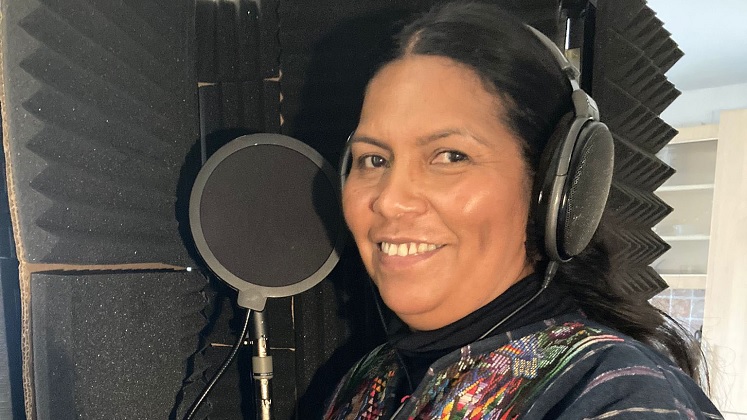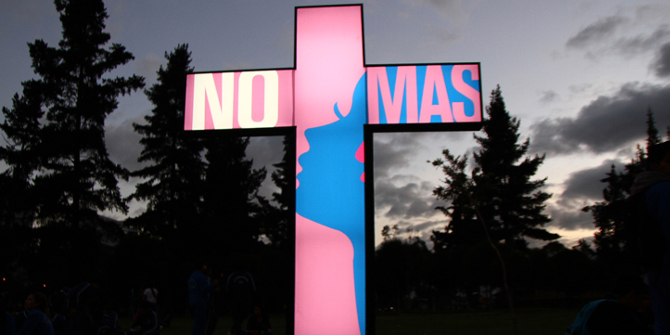A fire in a state-run shelter in Guatemala in 2017 brought together a group of women who have been fighting for justice for the victims ever since in this case. Cathy McIlwaine, Jelke Boesten (King’s College London) and Rebecca Wilson (Latin American Bureau) recall this incident and other two experiences of grassroots work throughout Latin America and the UK in the upcoming podcast series Women Resisting Violence.
Lea este artículo en español
Guatemala is considered to be one of the most unsafe countries in the world to be a woman. The country was the first in Latin America to acknowledge violence against women and create specific mechanisms for Indigenous women to report it after the national Peace Accords, signed in 1996 after 36 years of internal violent conflict. Still, Guatemalan women suffer some of the highest rates of intrafamily violence in the world.
According to the UN, 88 per cent of reported cases of violence against women in the country remain unpunished. Impunity in cases of femicide is estimated at 98%. This has been the reality for the survivors and families of the victims of a tragic fire in the Virgen de la Asunción children’s home just outside of Guatemala City, in 2017.
The Hogar Seguro de la Virgen de la Asunción (HSVA) is a state-run ‘safe home’ for vulnerable and orphaned children, many of whom are escaping abuse, kidnapping or trafficking. However, there have been multiple reports of abuse within the shelter.
On the morning of 8 March, a fire broke out in a classroom where 56 girls were locked in, as a punishment for attempting to flee the home. The fire was likely started by one of the girls as a protest, but despite their cries for help, they were not released by the authorities. 17 died inside the classroom and 24 died later in hospitals. 15 girls survived, with severe burns, some requiring facial reconfiguration and amputations.
The first episode of the multilingual podcast series ‘Women Resisting Violence’, addresses this incident. Co-created by researchers at King’s College London and the Latin America Bureau, this new podcast champions the innovative work of women denouncing gender-based violence in Brazil, Guatemala and the UK. The three-episode series aims to share important learnings from workers and survivors themselves, to positively influence broader policies around violence against women and girls, both within and beyond Latin America.
Despite the claims of abuse and the unwillingness of authorities – including police officers present where the fire took place – to save the girls by unlocking the doors, there has been no justice for the girls. The 15 survivors have been accused of crimes themselves.

One of the women participating in the episode (Louise Morris / Latin America Bureau)
Public policies and remembrance from the grassroots
In the first episode, women working alongside victims and families of the aggrieved speak about their work supporting one another and bringing their case to the courts.
Stef Arreaga is a Guatemalan woman who features in the episode as co-founder of Ocho Tijax. The grassroots organisation was born the night of the massacre. According to Arriaga, “we don’t feel at all protected by the authorities, and we don’t feel protected by the institutions that should be there to protect us. So we protect ourselves, together as friends, together as women. We create ties of solidarity among us women, and we seek justice too, together as women.”
The Guatemalan government neglected to assist survivors and families, and failed to seek justice – not even identifying or prosecuting the perpetrators.
Ocho Tijax offered support to the survivors and families of the victims with volunteers coordinating with lawyers to provide legal aid, arranging counselling and therapy for survivors, and accompanying families to court and covering the transport costs.
”There was such strong stigma against the mothers – although not towards the fathers – holding them directly responsible for the deaths of their daughters,” Arreaga recalls.
The work of this grassroots organisation has also focused on public policies and remembrance. The Guatemalan Congress passed a law that provides the survivors and their families with monthly subsistence payments, the main square in Guatemala City has been renamed ‘The Girls’ Square’ and March 8 was officially declared ‘National Day for Victims of the Tragedy at the HSVA,’ a day of mourning and demanding justice.
Next year, Latin America Bureau and King’s College London will host a roundtable event bringing together activists like Stef along with international policymakers who focus on gender-based violence. The aim is to highlight local learnings which would improve policies.
Women Resisting Violence features the background research of Cathy McIlwaine (involved in Resisting violence, creating dignity in Rio de Janeiro, Step Up Migrant Women and We Still Fight in the Dark projects) and Jelke Boesten’s Gender Justice Memory platform. The series will turn into a book in 2022 and overall, chronicle how the innovative work of grassroots organisations and campaigns can help inform and improve policy around violence against women, both within and beyond Latin America, from the grassroots up.
Notes:
• The views expressed here are of the authors rather than the Centre or the LSE
• This multilingual podcast, funded by the King’s College London ESRC-Impact Acceleration Account, will be released weekly from November 25 to December 9, 2021, in line with the international 16 Days of Activism against Gender-Based Violence. It will be available on all major streaming platforms in English, Spanish and Portuguese, and at wrv.org.uk/podcast
• Banner image by Bruno Adrian / Shutterstock.com
• Please read our Comments Policy before commenting





